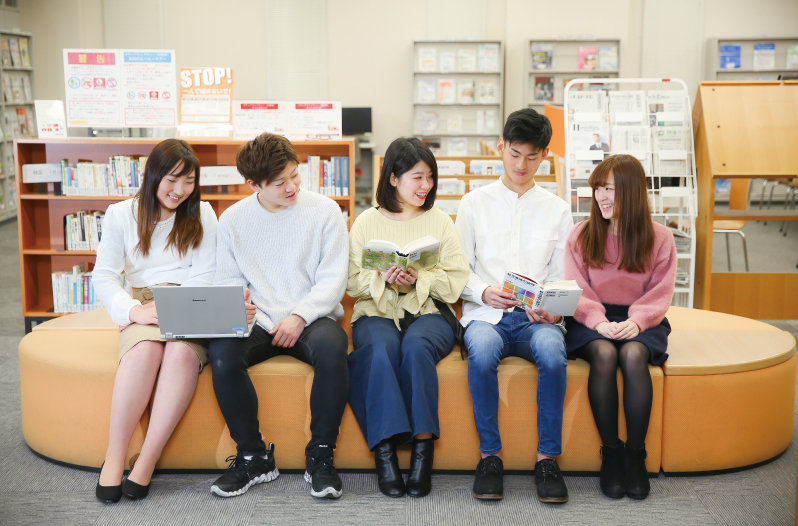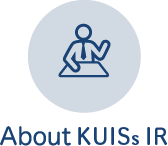KUISs IR for Student Support Story

-
University reform using data becomes a significant trend of the 2000s
Using data for the enhancement of university education----.
Institutional research (IR) at universities is drawing attention in recent years, prompting the establishment of IR sections at many universities. The concept gained popularity in the United States in the 1960s, but it was widely recognized in Japan only in the 2000s.This was driven largely by the revision of the School Education Act in 2002, which obligated universities to undergo external evaluation and at the same time perform self-evaluations to check that their educational and research activities met their respective objectives and targets.Later, in 2008, the Central Council for Education submitted a report on enhancement of undergraduate education to the Minister of Education, Culture, Sports, Science and Technology. The report recommended individual universities to clarify three policies: a diploma policy for defining the criteria for conferring academic degrees, a curriculum policy for organizing and implementing curricula, and an admission policy for selecting qualified entrants. This led to significant progress in IR in Japan, as universities were required to more accurately monitor their students' learning outcomes. Originally, IR is a broad concept involving the use of data to inform decision-making in areas including university management strategies. Owing to the aforementioned circumstances, however, IR in Japan focuses primarily on improving the quality of educational activities.
-
Accumulating results for 12 years as a pioneer of IR for student support
Kansai University of International Studies (KUISs) began engaging in IR activities ahead of this trend. One initiative was the establishment in 2004 of the Center for Assessment and Institutional Research, subordinate organization of the Research and Development Center for Higher Education, as a pioneer of self-evaluations based on data.
At the time of its opening as a four-year university in 1998, KUISs established Japan's first learning support center (currently the Academic Support Center) and developed a system to support student learning. This was followed by the introduction of a first-year education program, student portfolios, and benchmarks with which students can check the level of their academic achievement. Using the PDCA cycle, KUISs continues to lead the creation of a mechanism for steadily enhancing the students' strengths. The IR data is used to offer personal guidance to each student, and provide feedback for the continuous improvement of university-wide educational programs.
Drawing on its accumulation of experience in the uniquely evolved IR for student support, in 2012, KUISs became the representative of a collaborative program with Shukutoku University, Hokuriku Gakuin University, and Kurashiki Sakuyo University for building an educational management system for active learning. This was selected as a Program for Promoting Inter-University Collaborative Education by the Ministry of Education, Culture, Sports, Science and Technology (MEXT), and is making progress in the development of methods for evaluating students' learning outcomes. In 2013, KUISs joined the IR Consortium, comprising 41 universities in Japan (as of the end of academic year 2015), further broadening its scope of collaboration with other universities.
Based on 12 years of practical experience as a pioneer of IR for student support, KUISs continues to take on new challenges with the hope of blazing a trail for the future.
-
Keywords
■IR(InstitutionalResearch)
大学内のさまざまな情報を収集・分析し、教育や研究、学生支援、大学経営などに活用すること。 アメリカで1960年代に生まれて普及。 現在では日本でも多くの大学がこの考え方を取り入れて、専門部門を設けている。
■ポートフォリオ
学習の記録や成果、目標などを書き込んでいく記録ファイル。 クを通じて成長を確認しながら前進できるようになっている。 2007年からは電子化され「e-ポートフォリオ」に進化した。
■ルーブリック
学習到達度を可視化するために、表形式で評価基準を示したもの。 学生が目標に対してどこまで到達したかを具体的に判断することができる。
■リフレクション・デイ
半期に1度、学科目標の到達度について振り返りを行い、学生1人ひとりが改善点を明らかにする日。
■KUISs学修ベンチマーク
学生が身につけるべき能力を示したもの。5つの大きな目標とそれを達成するために必要な能力で構成されており、これらのチェックを通じて成長を確認しながら前進できるようになっている。
[5つの大項目]
・自律できる人間になる
・社会に貢献できる人間になる
・心豊かな世界市民になる
・問題解決能力を身につける
・コミュニケーション能力を身につける









